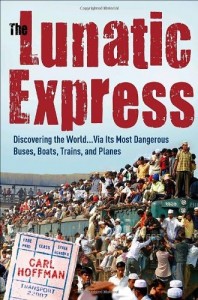If you watch the news from anywhere in North America, each and every day you will hear a sensationalized report from somewhere in the world about a transportation tragedy. Somewhere in the world, a bus full of people drove off a cliff on a dangerous road. Somewhere in the world, in a country where FAA rules mean squat, a 737 has crashed, killing all on board. Somewhere in the world, a crammed ferry boat has sank in bad weather, the dead packed like sardines at the bottom of the sea.

What Hoffman found, and wrote about in The Lunatic Express, is that danger really isn’t lurking around every corner in the ‘third world’ countries of the world. No frills, yes. Danger, maybe but not really.
Hoffman travels throughout South America, Africa and Asia on buses, boats, trains and planes. Really, his biggest discovery is that people are more friendly and social in these countries than North America.
This book is an excellent read for travellers who want to move past the typical tourist traps. The Lunatic Express
Upon his return to the United States, this is an excerpt of a run-in he had with his Greyhound bus driver:
We stopped an hour later so he put chains on the rear wheels for the trip over Vail Pass. I got out again, and a second later he jumped in and started forward again. I ran up to the doors and he barked again. “Ain’t leaving, dammit, just moving forward a bit. What’s your problem?”
In 50,000 miles no one had spoken to me like that. I lost it. “Why are you being such an asshole?” I said.
“Stay away from me!” he yelled. “I don’t like you!”
Welcome back to civilization, Carl Hoffman. In North America, we’re miserable and don’t have time for socializing or compassion. We have everything we could ever possibly need, yet we need more.
While travelling from Colombia through to Ecuador, in search of dangerous roads and the chance of having the bus stopped by bandits, this is what Hoffman actually experienced:
My seatmate out of Bogota was a round-faced girl named Maria, wearing a white hair band and dangling silver earrings, so shy she could barely look at me. She’d traveled twenty-four hours for work, spent two days in Bogota, and was repeating the twenty-four-hour journey home. “I could fly,” she squeaked, “too much money.”
We rose and fell and swirled through green, rugged, and steep mountains under gray skies that dribbled rain, on well-paved two-lane roads full of curvas peligrosas – dangerous curves – and every once in a while I’d catch Maria squeezed against the window staring up at me with as much fright and wonder as if she were sitting next to the Easter Bunny. Between my bad Spanish and her shyness, my attempts at conversation went nowhere. In the middle of the night the rain came harder, pelting down in the pitch blackness, and I figured any guerrillas out there in the cold jungle, on land so steep you could barely stand, would be hunkered down. But what if we did hit a roadblock? The FARC had a long habit of taking hostages, from local politicians like Ingrid Betancourt to American contractors to tourists. The thought stuck in my head as we passed an army patrol fanned out along the winding road, armed with M-16s. Maybe I could hide behind luggage in the overhead rack. Would the other passengers rat me out? What if the Guerrillas set the bus on fire, as they had done before?
At 4:00 a.m., Maria slipped away, and as it got light I noticed the man across the aisle staring at me. And then, just as we passed another curva peligrosa, I saw his hand vigorously moving up and down over his crotch. I turned my head. Guerrillas, mudslides, accidents – it seemed like sex was the only real threat.
Join Carl Hoffman on this 286 page journey around the world. Avid travellers, traveller wannabes and arm-chair travellers alike will enjoy this adventure immensely.

